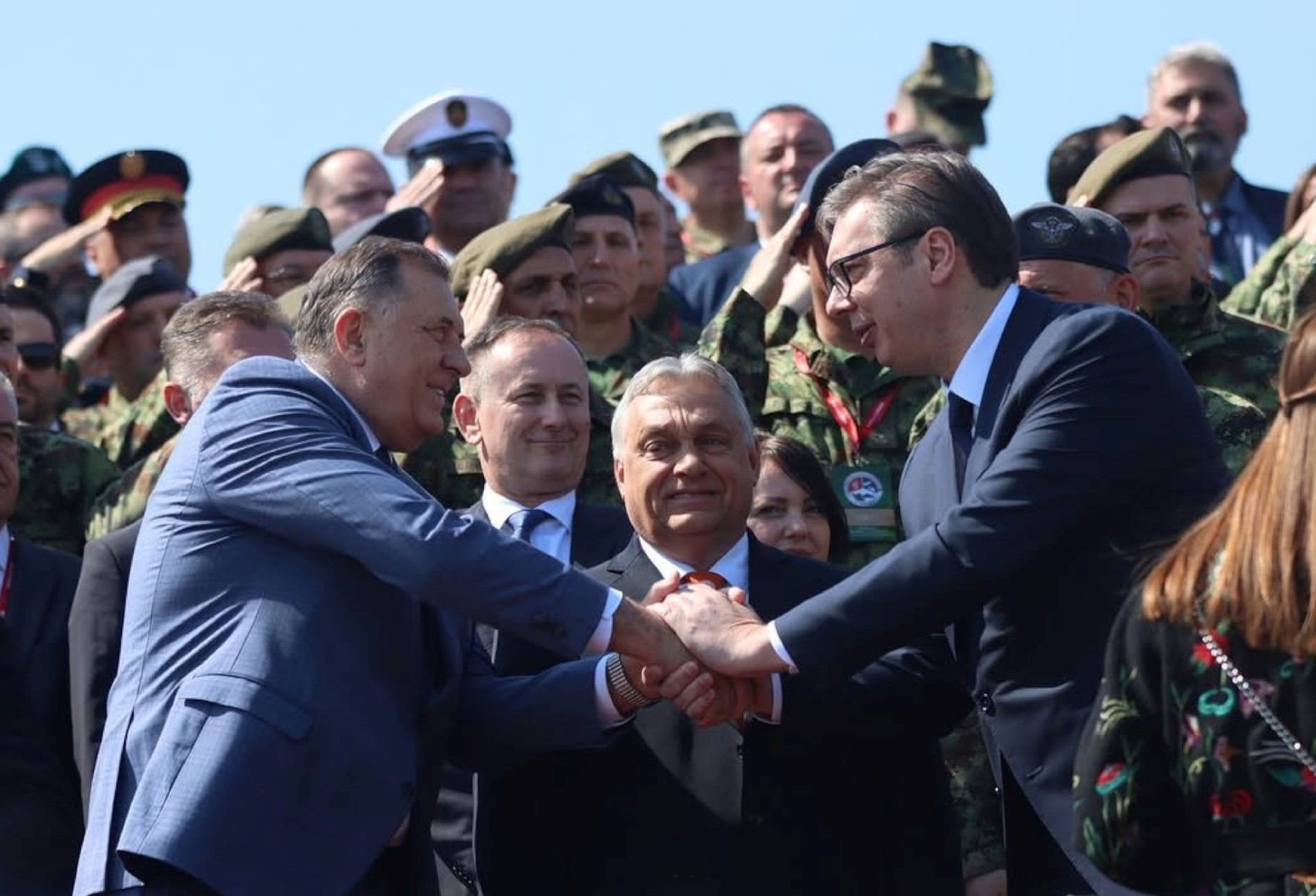Two scandalous stories that have been unfolding over the past few months have reached a new stage of development. These are the trial of Milorad Dodik in Bosnia and Herzegovina and the investigation into the deadly collapse of a canopy at the railway station in Novi Sad, Serbia.
Almost in parallel, at the same time, Dodik’s sentence was confirmed and officials were detained, whose actions, according to the investigation, led to the tragedy in Novi Sad.
The resolution is still far off, but at least the stagnation period is over.
Both cases have already significantly affected the domestic political situation in Bosnia and Herzegovina and Serbia. the further course of events will have long-term consequences for the political leaders in Banja Luka and Belgrade, for the Western Balkans, and for international actors who are actively trying to support them.
Among the latter, a notable and influential figure is Viktor Orban. Recent events have once again drawn attention to the Hungarian leader’s involvement in Balkan affairs.
Verdict in Sarajevo
On August 1, the Appeals Chamber of the Court of Bosnia and Herzegovina issued a decision in the case of the President of the Republika Srpska, Milorad Dodik, sentencing him to one year in prison and six years of disqualification from holding the office of RS President. Thus, the decision of the Court of Bosnia and Herzegovina of February 26 of this year was confirmed, when Dodik was convicted for approving laws adopted by the National Assembly of Republika Srpska (NARS), according to which decisions of the High Representative of the international community in Bosnia and Herzegovina, Christian Schmidt, are no longer recognized in RS.
This verdict can be considered the culmination of the confrontation between Sarajevo and Banja Luka. In fact, Dodik has been stripped of the possibility to remain in the office of RS President. Moreover, his overall political future is now in question.
As expected, the leader of the Serbs in BiH is supported by official Belgrade and personally by the President of Serbia, Aleksandar Vučić. Traditionally, Moscow is among Dodik’s supporters.
But the list of Dodik’s friends does not end with Vučić and Putin.
The current leader of the BiH Serbs is actively supported in Budapest.
Orban has previously demonstrated all sorts of support for Dodik. Hungary has been providing loans and grants to Republika Srpska, giving political backing to the RS leadership… It is widely known that Hungarian special forces allegedly went to Banja Luka to protect Dodik from arrest after another BiH court decision.
After the new verdict, the Hungarian Prime Minister’s position remained unchanged: absolute support.
On August 2, Orban stated that Hungary won’t recognize Dodik’s sentence. According to the head of the Hungarian government, it is “unacceptable” for a “regent” delegated by the European Union to overthrow and judge a president elected by Bosnian Serbs.
Thus, Orban almost verbatim repeated Dodik’s statement made the day before, when the RS President called the BiH court’s verdict a political step organized by the High Representative Christian Schmidt and supported by the European Union.
Arrests in Serbia
No less dramatic events could be observed in Serbia these days. On August 1, numerous suspects were detained in connection with the collapse of a canopy at the railway station in Novi Sad, which occurred on November 1, 2024, and led to the deaths of 16 people. This tragedy sparked a wave of protests in the country, which continue to this day. The main demand of the protesters is the punishment of those responsible for the tragedy. Protest participants had no doubt that corruption and nepotism in the government were the cause of the disaster. Law enforcement confirmed this version.
The Prosecutor’s Office for Organized Crime of Serbia detained 11 people on suspicion of committing corruption crimes connected to the railway modernization project from Novi Sad to the Hungarian border.
This project is part of the high-speed railway line between the capitals of Serbia and Hungary, which in turn is part of China’s “Belt and Road” initiative. The project operator is Budapest, which received a Chinese loan for it but classified all agreements with Beijing.
Belgrade also followed a path of non-transparency and secrecy.
As has now become known, Serbian authorities concluded a reconstruction contract with the Chinese consortium CRIC&CCCC (China Railway International Co. Ltd and China Communications Construction Company Ltd) based on an intergovernmental agreement between Serbia and China, without issuing a public tender. As a result, the Chinese company received an unlawful gain of at least $18.7 million due to price inflation and so-called additional works, and officials caused damage to the budget of at least $115 million through corruption schemes and abuse of office.
Among those arrested is Tomislav Momirović, who at the time of the reconstruction works headed the Ministry of Construction, Transport and Infrastructure. Goran Vesić, who previously held this position, is also implicated. A day before the arrests, Vesić was hospitalized and underwent emergency surgery.
Several more high-ranking officials from the current government team have been arrested.
The Serbian leadership expressed outright dissatisfaction with the arrests carried out by the prosecutor’s office.
Vučić stated that the arrest warrants for former ministers were issued “groundlessly,” that they are “scandalous,” and called the “behavior” of the Prosecutor’s Office for Organized Crime “criminal”.
“A time of accountability will also come for March 15 (when a mass anti-government protest took place in Belgrade) and other various attempts at a coup d’état,” said the Serbian president. “This will be a state governed by the rule of law, in which foreigners will not decide who will be behind bars,” he said.
Vučić did not explain how foreigners are involved in the arrests, but evidently, the Serbian leadership interprets the arrest of high-ranking officials as part of a “color revolution” aimed against the current Serbian government and organized by “the West.”
Expectedly, Budapest, which operates the Chinese railway project and constantly disputes with Brussels, is on Vučić’s side. Earlier, amid mass protests in Serbia, Orban even made a special statement in support of the Serbian government and pro-government political forces, calling the protests a result of foreign interference and stating that “Serbian patriots can count on Hungarian patriots”.
Hungary’s Balkan Objectives
It is clear why Dodik and Vučić are relying on Orban. On one hand, it’s the money that Belgrade and Banja Luka receive from Budapest or through Budapest, as in the case of the railway construction under the Chinese project. On the other hand, it’s the ability to have an “advocate” among NATO and EU member states. Hungary’s “special” position undermines the cohesion of European and Euro-Atlantic policy and makes it less effective and impactful, particularly in the Balkans.
It’s more difficult to answer the question of why Orban is so persistent in lobbying the interests of Dodik and Vučić.
The key version, which runs as a red thread through regional and international media publications, is that Orban is building an axis of authoritarian regimes and a network of illiberal political forces that are critical of Brussels’ policies but are ready to cooperate with Beijing and Moscow.
This process has several components.
- First of all, Orban is trying to change the ideological foundations of Europe by removing liberalism, globalism, and multiculturalism. An equally important goal for him is to strengthen, in his terms, the sovereignty of individual states and prioritize national governments over international institutions (EU bodies).
- To achieve his goals, Orban actively cooperates with China, attracting Chinese funds to develop a kind of alternative economy in Europe, which becomes an alternative to the EU and the West in general. Experts have long called Budapest “China’s hub in Europe,” and the railway to Belgrade is just one example of activity in this direction.
Beijing, which is doing its utmost to promote its economic and geopolitical interests in Europe, especially in the EU, is certainly satisfied with this partnership.
- Another geopolitical pillar for Hungary has become Russia. The authoritarian, anti-liberal Russian regime is welcomed by the current Hungarian leadership for ideological reasons, and the opportunity to receive cheap Russian energy resources strengthens this affinity.
In fact, by many indicators, Orban’s Hungary can be called a pro-Russian state. Moscow is clearly highly interested in the development of this cooperation and in supporting Hungarian policies that undermine EU and NATO unity.
What’s Next?
Because of all four of the above factors, Belgrade and Banja Luka are priority directions for Budapest’s foreign policy.
Leaders inclined toward authoritarian governance methods;
A society that supports conservative values;
An economy that is closed enough for the non-transparent advancement of Chinese projects;
The region’s dependence on Russian energy;
Pro-Russian sentiments among leading politicians and a significant portion of the electorate — all make Serbia and Republika Srpska, under the current governments in Belgrade and Banja Luka, an extremely favorable environment for the implementation of Orban’s ambitious plans in the Balkans.
The struggle “against a liberal and united EU,” the promotion of Chinese and Russian interests in Europe will be extremely complicated without Dodik and Vučić.
Therefore, it is extremely disadvantageous for the current Hungarian leader if there is a change of power either in Belgrade or in Banja Luka, which is why Orban protects and will most likely continue to protect his Balkan friends.
But the latest decisions by the Court of Bosnia and Herzegovina in Dodik’s case and by the Serbian prosecutor’s office regarding officials from the current Serbian government indicate that Dodik’s and Vučić’s positions may be shaken—and with them, Orban’s influence in the region.



